
Colin Spacetwinks still posts a lot online, and still writes and self-publishes essays, stories and games online, but in all honesty is mostly known for the posting, like that one Pagliacci tweet that got around a lot.
Ah, 2019. I still don’t have a decent computer, I still don’t have any modern consoles, I’m still a rando furry online, and I’m still playing Pinball Arcade, and I still think Bare Knuckle 3 (but not Streets of Rage 3) is better than Streets of Rage 2. The years go on, so much changes, and so much remains the same. Perhaps it’s fitting, then, that so many of the games that stuck out to me this year, old and new alike, had me thinking so much about the past and the way it impacts the present and the future to come yet--or the way that the present hasn’t changed much at all from the past, save for the aesthetics and the musical styles.
However, before I get into my GOTY list proper, this lack of ability to play a bunch of the hot new games of 2019 does require an honorable mention section, though of a different kind.
HONORARY “I DON’T HAVE ANYTHING THAT COULD PLAY THESE BUT I KNOW I’D FUCKING LOVE THEM IF I DID” MENTIONS: PATHOLOGIC 2 AND SHENMUE III

I loved the original Pathologic. And I love the previous Shenmue games, flawed as they might be. I could go on for endless reasons why, but my pal Dia Lacina has already so well articulated what makes these games so great--and we talked an awful lot about Shenmue as she was playing Shenmue III and working through her own thoughts on it. You can read her review of Shenmue III here, and her review of Pathologic 2 here, and based on my own history, tastes, and her thoughts, I know I’d love both of these, almost certainly for the same reasons she does. In our discussions of Shenmue, she’s also the one responsible for the phrase ‘Shenmue is Shenmue’ to describe the game’s quality and its appeal, and it’s ended up the same way I’ve come to describe it. I’m looking forward to hopefully getting to experience it for myself in 2020.
With that out of the way, onto what I am here for, and if you’ve been around for my previous lists, what you’re here for too: Entirely too long and verbose analyses of the games that have stuck with me.
10. Mega Mall Story 2
I like KairoSoft games. Quite a bit. Almost all of them are functionally identical to each other, just changing the setting around and tweaking mechanics a little, if at all. I still like nearly all of them, save for the freemium ones. If you've played Game Dev Story, you have a pretty good idea of what to expect from Grand Prix Story, and if you've played Grand Prix Story, you have a pretty good idea of what to expect from Pocket Stables, and if you've played Pocket Stables...
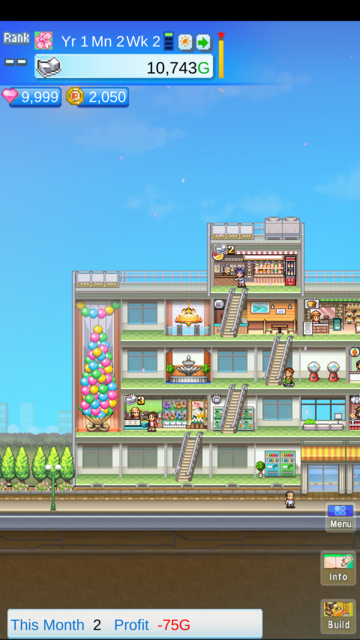
You get the idea.
The Mega Mall games are just a little different, and I mean little. So much from the history of KairoSoft's management sims is carried over, and I still like all of that. Where it's different is how it's inspired by an old favorite of mine, SimTower.
With most KairoSoft games, I'm getting the pleasant buzz of simply watching the numbers go up, and getting to see people come and go in their lives and stopping by my arcade, or my ramen restaurant, or watching my baseball team, or coming to my horse ranch, or so on and so forth. And I'm still getting that from Mega Mall Story 2, the enjoyment of seeing these little pixel humans come in, shop at my stores, leave. Seeing my stats go up, seeing my money go up, seeing me unlock new functions and buildings.
But most KairoSoft games, I'm not really paying attention to the building aspect, not the way I would prefer, anyway. Sure, I'll try optimize how things fit together for stat bonuses, but the act of building isn't the joy it could be.
SimTower, and Mega Mall Story in taking inspiration from it, fills that gap.
I remember loving building up, and up, and up and up some more in SimTower. I think I got the kind of kick out of it that one might attribute to people building the tower of Babel. There was something simply so satisfying about not just getting to see this tower stretch endlessly into the sky, but to be the one making it happen, and filling it out too. Not only could people people stand on a tiled floor hundreds of feet into the air, but in my tower, they could also see a movie and get a soft pretzel and even get married at that nosebleed level of elevation. There was just this raw, uncut joy of "tower big" as a child, and I still feel it kick inside of me as an adult.
It takes longer to do this in Mega Mall Story 2 due to the way the game is structured and cheating not being easy like it would be on the PC, but I still love getting to stack floor on top of floor on top of floor to arrogantly build humanity into the clouds themselves, and then doubling down on it by taking this achievement of human ingenuity and putting what I imagine as a Sbarro inside of it.
Tower big.
9. Street Fighter III: Third Strike
I'm not particularly great at fighting games. Never will be, especially not competitive level skilled. I don't have the patience or focus to keep track of frame data. Hell, I still can't make sense of the numerical representation of button and directional inputs. It scrambles my brains.
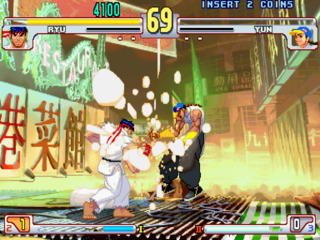
Still love a good one, though. The amount of time I sunk into Street Fighter Alpha 3 thanks to the World Tour mode is unreal. And while I haven't played nearly as much of Street Fighter 3 this year as I did SFA3 at its release, I've still had a blast revisting this classic.
All the old praise for the game still holds true; the fantastic pixel art and tuned up game balancing and the satisfaction of pulling off parries, the (mostly) highly memorable characters, it's still just plain good fun, both for casual and high tier players. But it's the specific context in which I've been playing SF3 that's made me appreciate it so much. See, I haven't been playing it at home on the computer or on a console, but at arcades.
We don't have a lot of arcades in Maine, of any sort. Hell, when the Dream Machine closed up years ago, I don't know if we really had any dedicated arcade anywhere for the longest time. Just little slices of them at movie theaters and theme parks and all. We only just got a Round 1 at the Maine Mall a little bit ago, as a matter of fact.
It's at that Round 1 where I really sat down and played some Street Fighter III. And, maybe resulting in some bias for it, the first time this year doing so was during my birthday party.
But actually sitting down at a fighting game cabinet and plugging away at increasingly cheap AI opponents really felt special to me, getting me back to moods I hadn't felt in years. Pulling threads of nostalgia through me, making me remember the days of crowds of middle and high schoolers coming around to watch people pull off fatalities in Mortal Kombat, and yet even bigger crowds for the 4 player X-Men cabinet, a game that really only achieved its potential when in the context of a crowded arcade with a rowdy and hyped audience. Try and play that X-Men game nowadays at home by yourself, it's just not the same without others around, without having to plug in your own quarters to keep going, creating a combination of mental chemicals that the console experience just couldn't quite recreate.
Now, Street Fighter III is still enjoyable as hell when played at home. It's still a rock solid fighting game, on the couch or at the arcade.
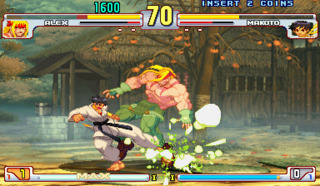
But playing at the arcade is the experience that makes it feel truly special for me. The game might be the same in your house or at the arcade at the mall, but the experiences you feel with each are distinctly different. And getting to re-experience the way a good game at an arcade makes you feel is what keeps SF3 in my mind this year.
That, and the unfortunate reality that I just plain suck ass with a stick. Much as I love playing it at the arcade, I'll never be as consistent at busting out Makoto's moves with a stick as I do with a controller.
But it doesn't really matter whether I'm any good at it or not. It's the experience of being in that artificially lit space, surrounded by masses of sound from other machines, and playing it in that pleasant chaos that grabs me tight.
8. The Zero Escape Series
I played and beat Virtue's Last Reward and Zero Time Dilemma for the first time this year, and then went back and re-played 999 afterwards, but it's all three together that keeps in my mind for 2019. And not because I think the story only truly achieves greatness by playing all three in the trilogy. Matter of fact, I think the storytelling and game design is weaker in VLR and much weaker in ZTD, and that the original 999 is still heads and shoulders above both of them. But I still wouldn't put 999 by itself here, because the specific way I came around to appreciating it more in 2019 requires VLR and ZTD.
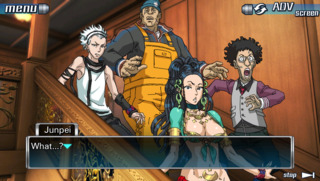
Quite simply, I needed the flaws of VLR and ZTD to make me appreciate 999 properly.
The Zero Escape games don't strike me as brilliant as much as convoluted, and sometimes that convolution makes for a fun story. The pseudo-science and pseudo-philosophy doesn't blow my mind, but it can make for an enjoyable ride, even as I might tease some of its excesses. And the characters aren't some wonders of nuance and depth that I'll never forget. Altogether, they're mostly enjoyable--though again, most of all in 999.
But it's the structure containing the story and the ways the story is told that really gets me.
One of the things I'd tease 999 and other visual novels about before are those massive text dumps, especially in the middle of life threatening situations. It feels a little like old superhero comics, with characters capable of spitting out three paragraphs of monologue while firing off optic blasts. It's a little goofy, it's a little hard to take seriously at times, it's a little over the top.
But playing through VLR, and especially ZTD, which cut back significantly on those long-ass text dumps, and then getting to experience them again in 999, made me see why they're part of the story in the first place:
Because they fucking work.
Yes, they're a little goofy, a little over the top, but those text dumps serve a point and they do it well. In Zero Time Dilemma, which replaced text narration with a set of sprites in favor of a more Telltale inspired series of cutscenes with full voice acting, you feel this empty air and time around everything. Playing through to the end, there's this unmistakable absence. The way the story is delivered, I end up feeling like I'm missing so much to know about every character in the game, even the main ones that have been part of the whole series.

But in 999, where a character will drop a 5000 word speech about some debunked science from decades ago, their own personal history, or their feelings on what's happening around them all before, during, and after deathtrap rooms they had to solve their way out of, you almost never feel lacking for connections with the story and the characters in it. Those chunks are lengthy as hell, yes, but they get so much communicated about the story, the themes of the story, the beliefs and history of the characters themselves, giving you something to hold onto while you try to work out how to get the next key that'll unlock the door. In other forms of storytelling, I'd be more critical of it, but within the context of a visual novel, a good text dump can do so much right. It felt strange at first to be yearning for a dozen pages spit out at the drop of a hat from one character after they noticed something in a room that reminded them of a conspiracy theory from 1972, but yearn I did.
To appreciate the good and great, sometimes you need the not-so-great. And so I appreciate the weaker entries in Zero Escape, because they made me better understand and appreciate 999 and just how tightly packed together a story it is.
7. Castlevania: Order of Ecclesia
Like 999, I also replayed Order of Ecclesia this year. More than once, actually. The NG+ function makes it easy as hell to boot up and blaze through a new playthrough, your ridiculously overpowered stats and mostly complete sets of equipment making much of the game a cakewalk. The only really difficult moments for me were the ones spent trying to get those optional boss medals that require you to beat them without getting hit once. I had to soft reset constantly to pull it off (especially for the giant tower crab battle), and while that was frustrating, it also made me pay more attention to the structure of Ecclesia itself.
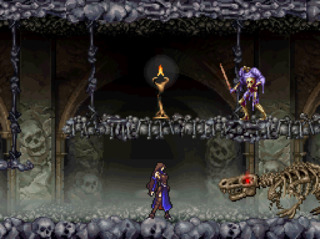
The game's a solid metroidvania in a long line of largely solid metroidvanias. Just a good, tight formula, revisited and tweaked each time. I love this formula, I don't mind that it didn't deviate too radically with each new title. If I did, I probably wouldn't be the Mega Man fan I am.
And I didn't find something in Ecclesia that revealed to me that actually it was a revolutionary change in the genre, but paying attention to those little gameplay tweaks and mechanic additions in a game that came a little over a decade after Symphony of the Night and over 20 years after the very first Castlevania, it made me see how much of Castlevania was constantly remixing and mashing itself up, diving back into its history and pulling ideas from years ago to see how they'd work in a new context.
People might see a hard separation between classic-'Vania games and SotN-'Vania material, and on the surface I wouldn't disagree. Sure, Dracula and the skeletons are still there, but the way the world is structured, the way you move around that world, and even the way you fight feels so different. But the post-SotN games kept revisiting the Castlevania games that came before it, not just for plot and lore, but for gameplay ideas, mechanical ideas.
Ecclesia gets at this with its pacing and much of its level design. For a large chunk of the game, you aren't actually going through one big castle with tons of individual sections within it. Instead, there are a bunch of different lands that end up feeling an awful lot like old school linear Castlevania levels (the Ruvas Forest stage goes as far as literally being a straight line). As you go along, you rescue people who come to Wygol Village, who offer various quests that give you reason to go back to their stages.
The very final level, however, is Dracula's castle itself, structured the way you'd imagine a metroidvania to be. It's actually possible to not get to Dracula's castle at all. You can achieve an early bad ending by missing or ignoring some details, causing you to miss out on a massive chunk of the game. And this stuck out to me this time around with Ecclesia, as I saw that it was pulling the same trick as Symphony of the Night, at the same point in the story as Symphony of the Night, but instead of a reversed castle, you get Dracula's castle as it is. Saving the actual classic metroidvania structure for the very last part of the game, after playing through a ton of levels that hearkened back in design and structure to the original Castlevania games, creating a game design that feels like playing through the history of Castlevania's game design itself. And not just from Castlevania to Symphony of the Night, but to Aria of Sorrow too, as the Glyph system takes from AoS' soul system. Hell, the villagers you rescue evoke memories of the kidnapped people you save in Rondo of Blood, but remixed into a new system.
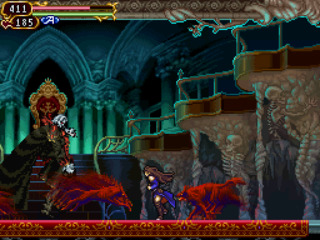
And when you notice that, you see the ways the games before Ecclesia pulled from Castlevania's design history too. Portrait of Ruin, for example, also takes inspiration from Rondo of Blood, with Jonathan and Charlotte taking after Richter and Maria in gameplay style, and then mashes that up with Castlevania III, which allowed you to swap between Trevor Belmont, Sypha Belnades, Grant Danasty, and Alucard himself on the fly-- and then of course adds all the usual SotN era design on top of it, but also beginning to experiment with the throwback separate level ideas that'd get into Ecclesia, as well. Hell, the infamously difficult Circle of the Moon (which was also criticized by Igarashi, who was not involved with its development) catches at some of this too, with its astonishingly low number of item drops and castle and enemy design constantly keeping you on your backfoot, requiring you to play it more like an NES-era 'Vania, with HP Up items feeling like they took the place of wall chickens.
And Bloodstained, which I didn't get to play this year, looks as though it has much of the same remixing of the past and the present going on with it. Not just looking for modern game ideas to keep adding to the metroidvania genre, but diving back into the history of Castlevania itself to see what old game design ideas can be repurposed and experimented with.
As a game on its own, I'd probably put Ecclesia as an 8/10. Not world shattering, but I always enjoy playing it. But when it comes to slowly revealing a lesson in game design and its history? It's hard to beat.
6. Crossniq+
I don't play a ton of puzzle games. Usually what I do is look for one or two in a year that really grab me and stick to that, or just go back to playing original Tetris and enjoying that rock solid formula. Last year, Puyo Puyo Tetris filled that space for me. For 2019, it's Max Krieger's Crossniq+.
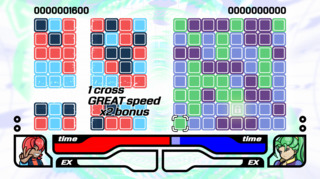
The first thing that catches you is just how tightly the game's art direction captures its self-stated Y2K era design. You could feel this game slipping right into place as a small but deeply loved Dreamcast title, or a hypothetical one-off experiment from Konami's Bemani team at making a puzzle game. The (fantastic) music, the fonts, the UI, the slogans, all of it creates this audio-visual experience that feels less like it's trying to remind you of the space circa 1999-2001, and more to convince you it came directly from it.
But Crossniq+ is still a puzzle game, so it still has to deliver on the gameplay. Sharply honed aesthetics can only do so much. Thankfully, it absolutely delivers.
The idea is simple enough, you make crosses by shifting around squares and lines of squares to line up a vertical and horizontal cross of all the same color, eliminating and then replacing it. The actual movement feels like a fusion of a digital Rubik's Cube and the Tetris Attack/Puzzle League/Panel De Pon games; you can rotate a line from one edge of the board to the opposite side if necessary, unless a locked piece keeps you from doing so, forcing you to come at a different approach to get another cross before the time runs out. While chains and combos are possible, the game isn't focused around the kind of giant chain reaction results of a highly skilled Puyo Puyo or Super Puzzle Fighter II player. Quick thinking is valued more than anything else here, which makes for a game that's great for beginners and has difficulty that scales well for those who want to get better and better at it. The differences in its design result in it engaging in an adjacent yet different set of skills in your brain than you'd normally apply to Tetris at high difficulties, and while it's hard to explain just how, when you play it, you can absolutely feel it.
The gameplay, the visuals, and the music all come together in one tight package that keeps you playing, bopping along as you cross and aim for the top, creating a personal rhythm despite not being a rhythm game. And at its dirt cheap price even when not on sale for under 10 bucks, you really can't afford to miss Crossniq+.
5. Dandara
Dandara is gorgeous. I love the music. I love the unique way you get around, being only able to jump from floor to ceiling and then back again, requiring you to master flipping as not only movement but also a completely different way of approaching combat. Can't just run back and forth to dodge fireballs, you gotta pick a point to jump to, and then another point to jump to yet. Keeps your mind and fingers active.
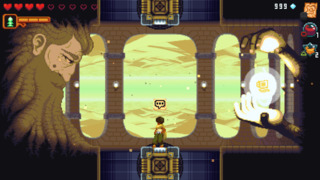
But I especially love the way it simply lets its mood wash over you. Dandara isn't a particularly text heavy game; the story doesn't have a giant mass of twists and turns to keep track of. So instead of piecing together the plot, much of the game is taking it in as an atmosphere, a sort of sensation to linger on top of you. The movement is rapid fire, but the fact that you can't just walk side to side means you can also spend a lot of time simply standing still. Press the stick as much as you want, until you hit that jump button, you're not going anywhere.
Which means that as frantic as Dandara can get, much of it is appreciating the moments of stillness when they do come around, be they story driven, or simply drinking in the calm of an environment cleared out of enemies. Standing at the camps, Dandara's equivalent of bonfires, gives you the time and space needed to check your map, think about where you need to go next, what you still have to do... but you could also just stand at the camps for its own sake. Think about the story you do have, of the balance being thrown off not between good and evil, but between creation and intent. Or think about nothing at all. Stand there and breathe in, breathe out, emptying the mind in a moment of stillness before going back to those rapid acrobatics the game demands of you.
Just enjoy the stillness of being in one place.
I certainly did.
4. Don't Wake The Night
In many of the games that make the claim that choices matter, there are particular structures around how you come to those choices, and the information that's doled out to you before you make them. And there's often a way to get a 'perfect' set of information, to know everything there is to know, so you can make the 'correct' choice, as determined by the game. Unlocking the third dialog option, so to speak, grayed out and tantalizing you with the possibility of getting to the place the developers clearly want, if only you could get the right information, or the right stats to unlock that information.
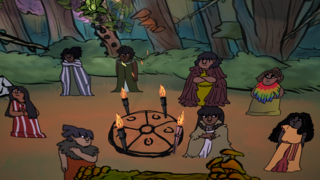
Don't Wake The Night gives you the power of choice--of judgment, really--but it keeps you restrained with a very simple truth: You don't know what you don't know, and there's only so much you could ever know, no matter how hard you try to know it all. Try as you might to get everyone's input, history, or some hypothetical objective truth not clouded by bias or faulty memories, you will never have every piece of information you need to make a decision.
Even in Don't Wake The Night, where you are a spirit summoned in a ritual by a group of women to judge and resolve a conflict tearing at the bonds between them, you could not possibly know everything. Not bound by humanity, and yet, you are still bound by the same lack of knowledge, the same inability to simply know. The truth, such as it is, is up to interpretation and constantly missing pieces that would make for a more whole existence. A 'neutral third party' is still just as subject to developing biases, still just as likely to have missed something that changes their perspective one way or another.
It's terrifying, isn't it? To be expected to mete out judgement as you are reminded again and again that you cannot grasp a perfect, objective perspective, an unmistakable truth that will lay all doubts to rest. You'd like to have a perfect set of information before deciding something so important.
So would I. So would many others. But we will never have that. But we cannot simply sit in inaction, spinning our wheels and avoiding making choices either.
There's a line in the intro to Don't Wake The Night that stays with me:
"Everything always ends well! ...Or, at least, things end..."
3. 10 Beautiful Postcards
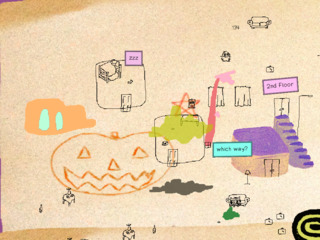
I've joked before that I can understand how trepanation would make a certain kind of sense to people in the past, because when you have an intense sinus headache, it truly does feel like ghosts and demons are clogging up your skull. Maybe if you just drilled a little hole there, all the garbage would seep out and you'd finally feel some relief.
10 Beautiful Postcards feels like that to me. A pleasant trepanation, if you can imagine such a thing. I sit down with it and everything falls out of my skull and my mind in the best possible way, giving me a chance to refresh myself and have a clean space to begin filling my head again once I'm done.
This might come off as saying that Postcards is 'dumb fun,' but that's not how I'd characterize it. A lot of the dumb fun in games for me is found in old beat-'em-ups or the like. Postcards, rather, has a structure and experience that, while many might find it overwhelming and chaotic, I feel soothed by it because it makes 'sense' to how my brain organizes thoughts and ideas.
From the mind behind Space Funeral and Goblet Grotto (and many more) comes this game that I'd say fits into a similar space as Yume Nikki. A strange, surreal, yet often pleasant and soothing walking experience, it--hm. Perhaps I should let the creator explain it in their own words instead.
"the brain flattened across a computer screen turns into a postcard that you can send to yourself" is exactly that mood I'm trying to speak of when I talk about a 'pleasant trepanation'. So much of what you find and what you read and what you experience comes across as this endless stream of consciousness translated into video game form, private inner word association jumping from one subject to the next by going from one room to the next, and even from one perspective to the next.
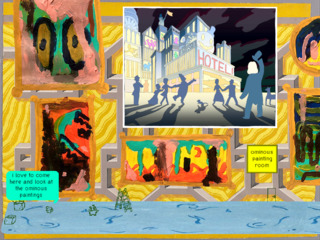
While much of your time walking around hotels and places related to hotels and hotels that hold other hotels within them occurs on a flat-yet-shifting plane, the game will just as quickly jump into 3D for a first person haunted house experience or driving a car across a strange land where massive animals that are made up of hotels themselves graze and wander, and then you walk into a door and it's right back to 2D. The information, the locations, the information and the dialog all comes rapidly and changes just as fast, and yet, I find this quite relaxing, because it fits so well with how my train of thought jumps around so much. This lack of clear and neatly organized structure feels comfortable to me, getting to wander around all these independent yet linked stray thoughts, like a digital representation of the millions of neurons in your brain that are constantly firing and forming new connections and thoughts.
Postcard's itch.io page declares "THE IMAGE IS HOTEL TO THE BRAIN," and while that may sound nonsensical, playing the game makes you feel that understanding more than anything.
One of the other ways the creator describes the game is, "a wonderful pile of rubble for you to sift through on your computer," and lord, ain't it just.
2. Anodyne 2: Return to Dust
Anodyne 2 begins with the main character, Nova, being born. Hatching, really. You exist in an island space, already fully formed, yet not. Able to run and jump and think and listen to 'Yolk Figures' and even shrink down to go inside of them and speak with the microscopic organisms within them. You do this to gather a series of nutrients, so you can become worthy of the Glandilock seed, which is necessary to ride the monorail hatchline to 'proper' existence. One of your creators, Palisade, tells you to think of the Glandilock seed as your ticket to ride. You are more or less assisting in your very own creation.
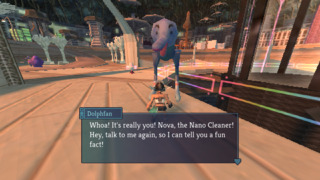
It's an interesting experience presented in a cute fashion, but if you put a little thought into it, it can quickly become unnerving. To exist, to be born, hatched while already fully grown and developed, like a full-size adult chicken stepping out of an egg. What's more, the point of your life has already been decided for you: you are a nano cleaner, and you have not just been chosen, but explicitly created for the purpose of saving New Theland from an infection of nano dust, which gets inside of people and messes with emotions and could overtake the world as you know it.
Playing Anodyne 2 feels like a discomforting fast-forwarded tape of your own life, only all the parts that should make up your past are blank static. There's no time for it, no chance to get experience life on your own terms, to develop by your own whims. It's like if you were thrust into the center of a "chosen one" narrative, but without any sort of history or sense of self or outside experience other than being The Chosen One. Imagine taking your whole life into your hands, every experience you had up till now that makes you who you are. And that every moment forward from this moment, you know you are a chosen one who has to save the world from some grand threat or another.
Now, snap your fingers, and imagine that snap causes all of your life before the moment of being the chosen one has never happened. Not even erased, per se, more like it retroactively never occurred in the first place. You are an adult, you are the chosen one, you have always been the chosen one, and you have always been an adult. You have never gotten to experience growth. You simply are, and always have been.
The more you think about this state of existence in Anodyne 2, the more unnerving it gets. Being a chosen one isn't fun and adventurous, it's claustrophobic and choking. "Destiny" becomes not a grand purpose for your life, but an invisible collar and leash yanking you ahead. There's no point to questioning anything, as all the answers are not only supplied to you, but they make up the DNA of your body, unignorable and unforgettable, overwhelming you with the weight of their expectations.
And this uncomfortable, slowly and quietly exhausting state of being is a big part of why I love Anodyne 2 so much.
All this makes Return To Dust sound grim, which let me say right now, it is mostly not. Especially when compared to the first Anodyne, which gets downright bloody with its kind of grim. In tone and presentation, Anodyne 2 takes a lot from the PS1 and N64 era of games, with bright colors and playful dialog, with fun touches here and there of meta self-awareness (one of my favorites being a graffiti tag that reads 'ENVIRONMENTAL STORYTELLING' in the first town). And its basic narrative and gameplay mechanic of shrinking into people to clean out what's troubling them gives me fond memories of curing people of their nightmares by going inside their dreams and physically attacking the beasts within.

But it's the story--which I don't want to spoil--and how it's told that truly holds me, the way it gets at this uncomfortable existence of never having the chance to be anything other than a hero. The way it deals with having to process new information, new ideas, different people and different ways of experiencing life when you've never been told anything other than what you've got is 'proper'. That's what makes Return to Dust so special.
That said, I also greatly enjoy the fact that to get around faster, you don't get a vehicle of your own, or increase your running speed. When you want to get from point A to point B quicker in Anodyne 2? You turn into a car.
Come to Return to Dust for the fantastic aesthetics, the cute dialog, the turning-into-a-car, and stay for a story of what we do when the world contradicts what we thought we knew about it, and ourselves.
1. Hypnospace Outlaw
Hypnospace's premise is a charming, interesting one: in an alternate universe 1999, you are a moderator for a Geocities-esque internet, charged with making sure everybody in the community is following the rules and also that viruses and scamware aren't getting around. The one major twist is that this is an internet accessed exclusively while you sleep! With a computer, modem, and a specially designed headband, you get to step into the world of Hypnospace, and access dozens upon dozens of fake homepages and fanshrines and email and automated MIDI files and everything else you'd expect of the internet of the era.

It's fun. It's funny. It gets the various aesthetics of the era without outright photocopying them. And the music, which includes a bunch of genres made up for this alternate universe (one of them being 'Coolpunk', an entire genre that gets kicked off by sampling sounds from an old commercial for a soda), is fantastic.
It could easily have been a perfectly satisfying nostalgia trip, a walk down memory lane for those like myself who remember the era of Yahoo Groups and Tripod hosted websites with 50mb limitations, that even gets all the niche details right, like incredibly earnest personal Christian home pages by both adults and children, and both of them using the same 20 or so gifs on their sites.
But Hypnospace Outlaw is much more than that.
There's a part very early on, just a little after the fantastic, intentionally and expertly garbled tutorial. One of the very first cases assigns you to hunt down and report any site using CapaCash, which is alternative digital money to HypnoCoin, the official and only legal form of commerce on HypnoSpace. There's a particularly egregious violator, Professor Helper, a BonziBuddy looking computer assistant that (also like BonziBuddy) is actually just a scam program that re-directs you to their business partners and advises you to buy their merch, which ranges from a triangular form of furniture for cats to a Christian fundamentalist book selling moral panic and fear of the endtimes. Hell, you can only uninstall Professor Helper by paying the company behind it a fee, and even when doing so, a pop-up window tells you that most of Professor Helper has been removed from your system, not all. You report each violation of the extra-legal commerce rule on Professor Helper's page, which knocks their rating down far enough that they can be flagged for temporary suspension and further investigation by HypnoSpace enforcers.
Then you get an e-mail.
It's forwarded through Dylan Merchant, but it's actually from his older brother, Adrian Merchant. The two of them are the co-founders of HypnoSpace, with Adrian as the CEO who does all the business work, and Dylan as the guy who handles the programming end of things. As a HypnoSpace enforcer, they are your bosses, so this message clearly must be important.
The message is rushed off textspeak that tells you in no uncertain terms to NOT flag Professor Helper, despite their site being the most blatant violator of the extra-legal commerce rule, because Adrian sees a business opportunity to be made with the shoddy, actively predatory program. Get rid of all the links to CapaCash, of course, but don't drive out this site that's actually making things worse for people using HypnoSpace. After all, there's money to be made here.

That email, that whole sequence, is a very small piece of Hypnospace Outlaw, and not nearly the most interesting or funniest part you'll come across in the game.
But it is an instructive piece. It's important. Barely any time into the game at all, and your boss' boss reaches out to tell you to ignore the rules and ethical codes you were informed of just about an hour ago so he can possibly make some extra cash. Extra cash made off a program that actively makes people's use of HypnoSpace worse, constantly popping up, pushing you to buy shit you don't want, and ransoming you for HypnoCoin if you want it to stop at all.
Let the actual service people are using rot, make it worse and harder to use, let a scam company and their program roam unpunished, because the CEO wants to make a couple extra bucks.
Yes, Hypnospace Outlaw is about the internet of old, of webrings and guestbook pages and AIM logs. But HypnoSpace Outlaw is also about the internet of our era, where non-existent, ineffective, or actively malicious moderation is backed up by companies that do not give a shit about the well being or even simple product satisfaction of their community and userbase, so long as they get to keep making money and do whatever they want without consequence.
Here's the real trick, though: Hypnospace is about both and neither of these forms of the internet. Because, aesthetics aside, they're not separate--they're the same internet. The forces behind the dot com boom and bust and the social media hellscape we live in today are one and the same, with names that were responsible for the problems of the past still floating around and causing many of the problems with the present. Your current inability to get a company to recognize a death threat you've been sent on their service as such, or the ultimate ineffectiveness of mass negative reaction from thousands of users on changes to the service, is exactly like what you'd get from internet companies of the '90s. And the fact that said companies ignore everyone on serious, dangerous issues, but won't hesitate to ban your ass if they find a five second clip of a TV show that a network wants pulled down? It is exactly like the internet of the past. If you're old enough to remember what UseNet is, you probably also remember companies sending out a barrage of Cease and Desists to various newsgroups spreading around X-Files fanfic.

The more the internet changes, the more it stays the same.
Hypnospace Outlaw uses this commentary of this changing-yet-unchanging internet to bring you in to hands-on experience and interrogate the banality of evil, where apathy, pettiness, and self-obsession are as much a cause of suffering as outright malice. One half of MerchantSoft's CEOs is motivated by just trying to build up their wealth and doesn't actually care what happens to Hypnospace or the community on it, and the other half gets in so deep on their own pet projects that they have the same dismissals of the problems rotting their own creation from the inside out, and punish their own moderators and employees who try to bring up the problems with them in the first place. It cleanly fits right inside of our own world, where reporting your problems your boss is causing to HR is just as likely to get you fired, or where reporting detailed, reported death threats on social media is quite likely to get a response of "Sorry, we don't see any problem here."
Speaking of, there's another early segment in Hypnospace Outlaw that stands out. A 16 year old girl on the Teentopia zone is trying to get a Hypnospace enforcer's attention on their homepage, changing her status to specifically call out for help and posting chat logs from two boys on the site who are harassing her.
Thing is, your moderator tools can't actually help her. The limited ways in which you can apply your reporting tools doesn't let you attribute evidence of another user's harassment on someone's own page to the person doing the harassing. You can only report the owner of the page itself. And Hypnospace enforcer's aren't allowed to speak directly with the users, so this girl is shouting out, begging for help, and you can't help her. Hell, you could report her instead for posting logs of her harassment.
You might think, "That's stupid. Why can't I just report the user who's doing the actual harassing? Why can't I just talk to the user?" And you might chalk it up to the limitations of the game mechanics and of games in general; there's only so much you can do to simulate the vast variety of options and choices available to any human being at a point in time. And in a sense, I suppose that's true.
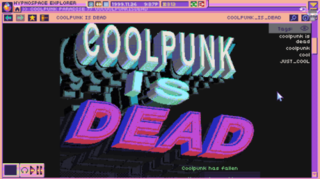
But these frustrating limitations, these poorly designed moderator tools, and the owners of the company expecting you to bend or ignore the rules for when they break them while caring not one bit what happens to the people who actually have to play by the rules--that's tech companies. That's so much of companies, period. Power, pettiness, apathy, a kind of low-key cruelty and high-key self-centeredness creating real systems of evil, systems that truly and materially hurt people.
Hypnospace Outlaw is a very funny game with a fantastic little fake product called "Granny Cream's Hot Butter Ice Cream" with a delightfully bad-good jingle. It's a great trip into the past for people who remember when everyone had their own homepages instead of being on all the same three-to-five sites.
And it's an incredibly thorough, utterly damning condemnation of the companies and the people in charge of so much of our world, and how much suffering they let happen because they simply do not care what happens to their customers.
11 Comments